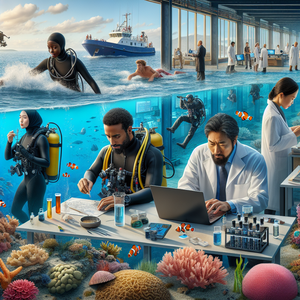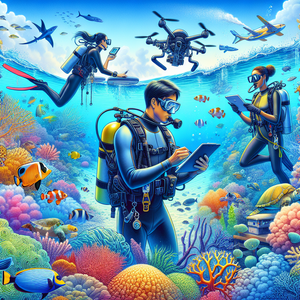
Exploring Career Paths in Marine Science: 10 High-Demand Opportunities
Are you passionate about the ocean and eager to make a positive impact on our planet? The field of marine science offers a wealth of career opportunities for those dedicated to understanding and safeguarding the intricate ecosystems of our seas. With the growing recognition of environmental challenges, the demand for marine science professionals is surging. According to recent studies, job growth in this sector is projected to increase significantly, with many roles offering competitive salaries that reflect the importance of their work. From marine biologists conducting groundbreaking research to aquarists who inspire the next generation of ocean advocates, the paths available in marine science are diverse and fulfilling. This article delves into ten exciting career options, highlighting the responsibilities, necessary qualifications, and their vital contributions to marine conservation.
Job Summaries:
Marine Biologist:
- Marine biologists explore the ocean and study marine ecosystems.
- They study the behavior of fish and the impacts of climate change on coral reefs.
- Fieldwork involves collecting samples and data analysis in laboratories.
- A bachelor's degree in marine biology or a related field is typically required.
- Advanced research roles may require a master's or Ph.D.
- Marine biologists shape conservation policies and strategies to protect ocean health.
Aquarist:
- Aquarists are the caretakers of aquatic life in aquariums and educational facilities.
- Their day-to-day responsibilities include feeding fish, monitoring their health, and maintaining optimal water conditions.
- They also design exhibits that educate the public about marine ecosystems.
- A bachelor's degree in marine science or biology is generally needed, along with practical experience in animal care.
- Through their work, aquarists foster public awareness and appreciation for marine conservation, making them essential educators in the field.
Marine Science Research Technician:
- Behind every great marine study is a skilled research technician, who provides critical support in data collection, laboratory experiments, and field research.
- They prepare samples, operate specialized equipment, and analyze data.
- A bachelor’s degree in marine science or a related field is often required, along with strong analytical skills.
- This role is integral to advancing scientific knowledge, enabling discoveries that inform conservation efforts.
Environmental Consultant:
- Environmental consultants specialize in assessing the ecological impacts of projects that may affect marine and coastal environments.
- They conduct thorough site assessments, develop management plans, and ensure compliance with environmental regulations.
- Typically requiring a background in marine science or environmental studies, many positions prefer candidates with a master’s degree.
- Strong communication skills are vital for conveying findings to clients and stakeholders, ultimately promoting sustainable practices in development.
Marine Mammal Trainer:
- Marine mammal trainers work closely with intelligent species like dolphins and seals.
- Training them for public displays and conducting health assessments.
- A degree in marine biology or animal science is generally preferred.
- Hands-on training experience is important.
- These trainers enhance public engagement through educational performances.
- They play a key role in marine conservation advocacy.
Aquaculture Technician:
- Aquaculture technicians are essential to the sustainable seafood movement.
- They oversee fish farming operations that help reduce pressure on wild fish populations.
- Their responsibilities include monitoring water quality, feeding, and ensuring optimal growth conditions for aquatic organisms.
- A bachelor’s degree in marine science or aquaculture is typically required.
- By promoting responsible farming practices, technicians contribute significantly to food security and environmental sustainability.
Marine Ecologist:
- Marine ecologists examine the interactions between marine organisms and their environments, focusing on ecosystem dynamics and biodiversity.
- They conduct field research and data analysis to inform conservation strategies and policies.
- Advanced positions usually require a Ph.D. in marine ecology or a related discipline.
- Their research is critical for understanding how human activities impact ocean health and for developing effective conservation measures.
Coastal Zone Manager:
- Coastal zone managers play a crucial role in balancing ecological health with human activity in coastal regions.
- They develop policies, oversee sustainable development projects, and advocate for conservation efforts.
- A degree in marine science, environmental science, or urban planning is typically necessary.
- Coastal managers ensure the protection of vital ecosystems while fostering responsible use of coastal resources.
Marine Engineer:
- Marine engineers tackle the technical challenges of designing and maintaining structures in marine environments, such as ships and offshore platforms.
- They apply engineering principles to solve complex problems, ensuring safety and efficiency.
- A degree in marine engineering or a related field is required, along with strong technical skills.
- Their innovations are vital for advancing marine technology and enhancing operational safety.
Marine Policy Analyst:
- Marine policy analysts are at the forefront of developing effective conservation policies.
- They analyze data, conduct research, and provide recommendations to government agencies and organizations.
- A background in marine science, environmental policy, or law is typically necessary, often requiring a master’s degree.
- This role is essential for shaping policies that guide sustainable resource management and marine conservation efforts.
The careers highlighted here not only offer a chance to engage with our planet's most vital ecosystems but also reflect the growing need for skilled professionals in marine science. Each role contributes uniquely to the broader goal of preserving marine environments, ensuring that future generations can continue to explore and benefit from our oceans. As interest in marine conservation surges, now is an opportune time to embark on a career in this field. With a combination of passion, education, and dedication, individuals can profoundly impact our world's marine landscapes.
Explore More Jobs

